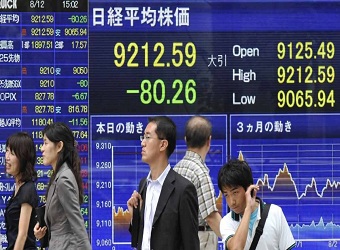Asian equities were mostly muted after soaring in the previous trading session with investors focused on key regional events unfolding in the day, including a presidential election in South Korea and the release of the Australian federal budget.
South Koreans take to the polls today to choose a new leader after the ouster of former President Park Geun-hye on bribery charges. The front-runner in the election is Moon Jae-in from the liberal Democratic Party of Korea. Polls show that Moon has secured 38 percent of support from voters among a total of 13 candidates, according to Reuters.
“The election result is largely priced into the markets. The Korean markets are up about 4 percent this month. They are one of the best performing Asian markets … so the market is expecting a change there,” Principal Global Investors Managing Director Binay Chandgothia told CNBC.
“The next move in Korea will depend on how Samsung and the electronics cycle behave, and of course, how the policy making comes out from the new government.”
Markets in the country are closed today.
Japan’s Nikkei 225 was mostly flat, trading 0.08 percent lower after surging more than 2 percent in the previous session.
Hong Kong’s Hang Seng Index rose 0.33 percent. Markets on the mainland were mixed, with the Shanghai Composite sliding 0.06 percent but the Shenzhen Composite reversing earlier losses to gain 0.223 percent.
In Hong Kong, the suspension in the trade of China Huishan Dairy Holding shares was extended by regulators. Shares of the troubled company plunged 85 percent in March this year.
The S&P/ASX 200, Australia’s benchmark index, fell 0.27 percent, driven by the financials sub-index, which experienced a 1.68 percent drop.
Down Under, banks traded lower due to reports of a bank tax that could be included in the budget for the fiscal year starting July 1 that will be released at 5:30 pm HK/SIN today. Commonwealth Bank fell 2.78 percent, ANZ was off by 2.04 percent and Westpac was down 2.51 percent.
“(T)he market is likely to be nervous about this prospect until they get details of what might be involved and what capacity of banks might have to pass this cost on to customers,” CMC Markets Chief Market Analyst Ric Spooner said in a note.
Citibank analysts retained a “Sell” rating on Westpac, which reported solid half-year profits yesterday.
“(Westpac’s) current profitability trends are the same as we have seen for ANZ and National Australia Bank. Despite this, Westpac trades on a sizable PE and PB premium to these banks, which we think will be hard to maintain,” Citibank analysts Craig Williams, Brendan Sproules and Andrew P. Tam said in a note.
Over in Singapore, OCBC reported net profits for Q1 rose 14 percent on year. However, OCBC’s net interest income of S$1.27 billion reflected a decline of 3 percent on year. Shares of the bank were higher by 0.97 percent.
The euro, which traded at a six-month high of $1.1023 early yesterday, was softer against the dollar and traded at $1.0929.
The dollar index, which measures the greenback against a basket of currencies, traded at 99.111. Against the yen, the dollar traded at 113.21, its highest level it almost two months.
Meanwhile, the Aussie continued its slide against the dollar, off the $0.74 handle seen last week. The Aussie last traded at $0.7358.
“While the Japanese yen’s underperformance can be largely attributed to the move higher in U.S. Treasury yields, the Australian dollar’s underperformance is also due to another soft night for key Australian commodities,” National Australia Bank Currency Strategist Rodrigo Catril said in a Tuesday morning note, highlighting the fall in iron ore, steam coal and aluminium prices.
The Korean won bucked a three-day losing streak against the dollar to trade at 1,133.75 at 11:30 am HK/SIN.
In energy news, oil prices initially rose on the back of renewed hopes that output cuts from OPEC and non-OPEC oil producers could potentially extend to 2018, but traded flat as the session wore on. U.S. crude traded 0.02 percent higher at $46.44 per barrel while Brent crude was higher by the same level at $49.35.
Overnight in the U.S., equities traded mostly flat while European stocks fell slightly in yesterday’s session following Emmanuel Macron’s win in the French presidential election on Sunday.
Source: CNBC


